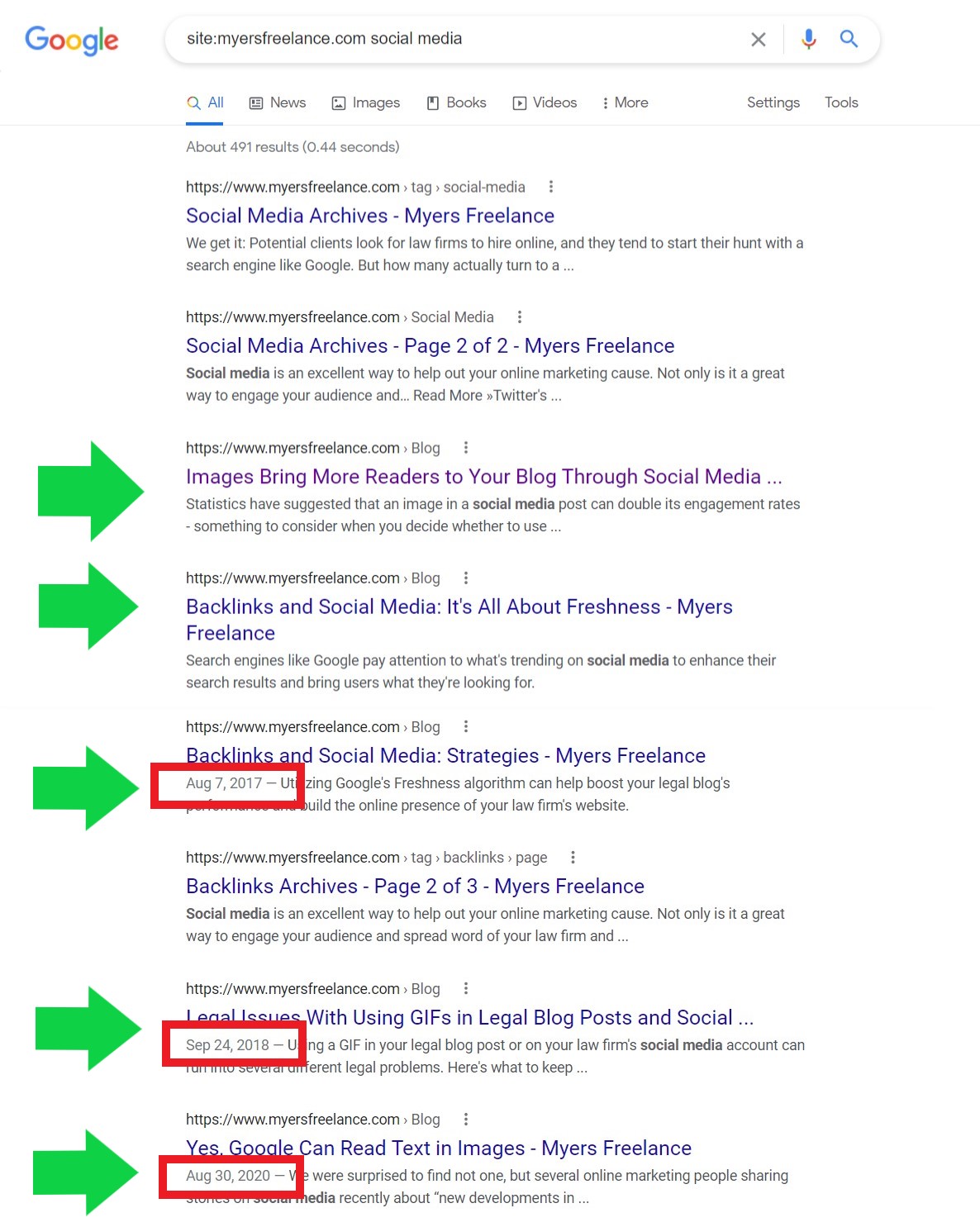A little over a year ago, we caught Google playing with the datelines in the search engine results page (SERP). It seemed like it was trying to guess which dated blog posts were actually filled with evergreen content:

They weren’t very good at it. Of the top 20 hits from our page, 10 were blog articles that were unambiguously evergreen, while another 6 were clearly topical (4 were a mixture). Google correctly showed or hid the dateline on only 7 of those 16 listings, and only correctly took the affirmative step of removing the dateline once.
So: Has Google gotten better at this in the past year? Let’s take a look.
Yes, They’ve Gotten Better
13 months ago, Google correctly pegged 7 of the 16 articles as topical or evergreen. Now, it is correctly tagging 10 of 15 (one of the articles in the list has been de-indexed and we’re looking into that):
| Blog Title | Does It Need to Be Fresh? | Dateline in SERP (4/29/21)? | Dateline in SERP (5/29/22)? |
|---|---|---|---|
| Backlinks and Social Media: It’s All About Freshness | An ironic probably | No | No |
| Backlinks and Social Media: Strategies | No | Yes | No |
| Google’s Freshness Update Gets Applied to Featured Snippets | Yes | Yes | Yes |
| Where’d Our Blog Go? | Yes | Yes | Yes |
| Evergreen Legal Blog Posts are Dying | A soft yes | No | Yes |
| The Q&A Format for Legal Blog Articles | No | Yes | Yes |
| Lessons from the Trump Googlebomb | Yes | Yes | No |
| What is the Role of the Legal Blog in Online Marketing Today? | Probably | No | No |
| All the Different Legal Marketing Job Titles Explained | No | Yes | No |
| Images Bring More Readers to Your Blog Through Social Media | No | No | No |
| Legal Issues With Using GIFs in Legal Blog Posts and Social Media | No | Yes | Yes |
| Google Can Read Text in Images | Yes | Yes | Yes |
| Escaping the Terrible Cycle of Web Traffic and Rankings | No | Yes | Yes |
| Hyper Local SEO is Another Red Herring for Law Firms | Not really | Yes | No |
| 8 Places to Find a Legal Blog Image and 3 Places to Avoid | No | Yes | No |
| Twitter Gaffes and What We Can Learn from Them | No | Yes | N/A |
| How to Write Yourself Into a Great Blog Image | No | Yes | No |
| 2 Possible Themes from Google’s December Algorithm Update | Yes | Yes | Yes |
| How to Leapfrog Competition By Scoring a Featured Snippet | No | Yes | Yes |
| Google Says Author Bylines Are Not an SEO Signal | Yes | Yes | Yes |
So, not bad! Going from 44% to 67% is a nice increase. But we think the results are a bit more impressive than that, even though this is a small sample size.
Google is Getting Bolder in Stripping the Dateline Away
Recall that this whole fiasco is based on the difference between topical and evergreen blog posts. Long ago, like when we first started this blog on legal blogging, the blog was nothing more than a medium for your online marketing content. It was where you put everything, from your most topical, newsy information that would grow stale in a month, to your most evergreen content that would be just as useful next year as it was when you first published it.
But then, in its eternal quest to get you the most relevant and important results for your search query, Google decided that it mattered when an article was published. Posts published long ago were probably less relevant and important those published just yesterday on the same topic.
Google had already implemented its Freshness Update way back in 2011. Now, though, it amped up the importance of fresh content.
One way that it did this was to slowly demote the SEO potency, and therefore the rankings, of content that had a dateline – i.e. blog posts.
When we saw Google playing with the datelines in the SERP last year, it was a huge moment. It told us that Google had realized that its application of its Freshness Update may have gone too far. It told us that Google was trying to be more holistic with its approach, rather than slowly demote all articles that happened to be blogs.
That’s why we think that the numbers in this update are better than they seem. Recall that the default had been that all blog posts had a dateline, so all blog posts – whether topical or evergreen – would suffer over time.
Last year, Google had overturned that default only 4 times out of 20. Out of those 4 articles that Google had determined to be evergreen and stripped off its dateline accordingly, we thought that it was only definitely correct once.
After a year of tweaking with its algorithm and looking for evergreen blog posts to un-date in the SERP, Google has gotten both bolder and better. Out of the 19 indexed pages, it had stripped the dateline off of 9 of them. Nearly half of the time, rather than 1 in 5. We would say that it got it right 5.5 times out of those 9 (the page on hyper local SEO being a red herring for law firms only leans evergreen, so we gave Google a half-point for stripping the date off in the SERP listing).

What This Means for Your Legal Blog
What this means for your legal blog and your online content marketing strategy is that Google is getting a bit better at differentiating topical content from evergreen content. It means that Google realized that evergreen blog posts were dying, and took action to focus its Freshness Update on topical blog posts, rather than all of them.
This is nice. You no longer have to strictly abide by the rule of compartmentalizing evergreen content in targeted pages and out of your legal blog.
However, we still highly recommend doing so. As the (limited) data suggests, Google still isn’t too good at differentiating content that should be demoted over time and content that has better staying power and a longer shelf life. Until the search engine is reliably accurate, we suggest making that decision for them and making your legal blog exclusively for topical articles that will not have much value in a year.